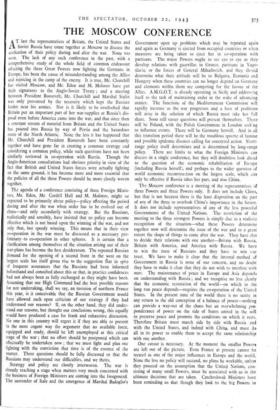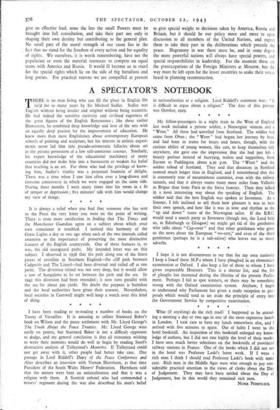THE MOSCOW CONFERENCE A T last the representatives of Britain, the
United States and Soviet Russia have come together at Moscow to discuss the unification of their policy during and after the war. None too soon. The lack of any such conference in the past, with a comprehensive study of the whole field of common endeavour affecting the three Great Powers now fighting the Germans in Europe, has been the cause, of misunderstanding among the Allies and rejoicing in the camp of the enemy. It is true, Mr. Churchill has visited Moscow, and Mr. Eden and M. Molotov have put their signatures to the Anglo-Soviet Treaty ; and a meeting between President Roosevelt, Mr. Churchill and Marshal Stalin was only prevented by the necessity which kept the Russian leader near his armies. Nor is it likely to be overlooked that Britain put an important part of her war-supplies at Russia's dis- posal even before America came into the war, and that since then a constant stream of material from Britain and the United States has poured into Russia by way of Persia and the hazardous route of the North Atlantic. None the less it has happened that Mr. Churchill and President Roosevelt have been constantly together and have gone far in creating a common strategy and considering a common policy, while such questions have not been similarly reviewed in co-operation with Russia. Though the Anglo-American consultations had obvious priority in view of the fact that British and United States forces were actually fighting on the same ground, it has become more and more essential that the policies of all the three Powers should be more closely woven together.
Th-e. agenda of a conference consisting of three Foreign Minis- , ters, Mr. Eden, Mr. Cordell Hull and M. Molotov, might ue expected to be primarily about policy—policy affecting the period during and after the war when order has to be evolved out of chaos—and only secondarily with strategy. But the Russians, realistically and sensibly, have insisted that no policy can become effective which is not based upon the winning of the war, and not only that, but speedy winning. This means that in their view co-operation in the war must be discussed as a necessary pre- liminary -to co-operation in other spheres. It is certain that a clarification among themselves of the situation arising out of their war-plans has become the first desideratum. The repeated Russian demand for the opening of a second front in the west on the largest scale has itself given rise to the suggestion that in spite of frequent assurances that the Russians had been informed beforehand and consulted about this or that, in practice confidences had not always been as fully exchanged as they might have been. Assuming that our High Command had the best possible reasons for not undertaking, shall we say, an invasion of northern France this year, is it conceivable that the Russian Government would have allowed such open criticism of our strategy if they had understood our reasons? If, on the other hand, they did under- stand our reasons, but thought our conclusions wrong, this equally would have produced a case for frank and exhaustive discussion. No one in this country will regret it if they are able to present in the most cogent , way the argument that no available force, equipped and ready, should be left unemployed at this critical stage of the war ; that no effort should be postponed which can effectually be -undertaken now ; that we must fight and plan our fighting with the conviction that time is of the essence of the matter. These questions should be fully discussed so that the Russians may understand our difficulties, and we theirs.
Strategy and policy are closely interwoven. The war is already reaching a stage when matters very much concerned with the business of Foreign Ministers are coming into the foreground. The surrender of Italy and the emergence of Marshal Badoglio's Government open up problems which may be repeated again and again as Germany is ejected from occupied countries or when measures are being taken to eject her in co-operation with partisans. The major Powers ought to see eye to eye as they develop relations with guerrillas in Greece, partisans in Yugo- slavia, or the forces of General Mihailovich, and they should determine what their attitude will be to Bulgaria, Rumania and Hungary when these countries can no longer depend on Germany and elements within them are competing for the favour of the Allies. A.M.G.O.T. is already operating in Sicily and addressing itself to the task of maintaining order in the wake of advancing armies. The functions of the Mediterranean Commission will rapidly increase as the war progresses and a host of problems will arise in the solution of which Russia must take her full share. Soon still vaster questions will present themselves. There will be Poland, with the Polish Government in London seck'ng to influence events. There will be Germany herself. And in all this transition period there will be the troublous spectre of famine and possible epidemic diseases calling for concerted action. Short- range policy itself determines and is determined by long-range policy. There are limits to what the Foreign Ministers can discuss in a single conference, but they will doubtless look ahead to the question of the economic rehabilitation of Europe (including Russia herself), and perhaps to the wider question of world economic reconstruction on the largest scale, which can only be effective if Russia takes her part, and also China.
The Moscow conference is a meeting of the representatives of three Powers and three Powers only. It does not include China, but that is not because there is the least disposition on the part of any of the three to overlook China's importance in the future. It does not include representatives of any of the less powerful Governments of the United Nations. The restriction of the meeting to the three strongest Powers is simply due to a realistic recognition of the situation—what these Powers determine together now will determine the issue of the war and to a great extent the shape of things to come after the war. They have also to decide their relations with one another—Britain with Russia, Britain with America, and America with Russia. We have to win the trust of Russians and they have to win our trust. We have to make it clear that the internal method of Government in Russia is none of our concern, and no doubt they have to make it clear that they do not wish to interfere with ours. The maintenance of peace in Europe and Asia depends on understanding with Russia ; and we recognise no less clearly that the economic restoration of the world—on which in the long run peace depends—requires the co-operation of the United States. In the present state of the world there is no sanity in any return to the old conception of a balance of power—nothing can provide a way-out of the chaos but an overwhelming pre- ponderance of power on the side of States united in the will to preserve peace and promote the conditions on which it rests. Therefore Britain must march side by side with Russia and with the United States, and indeed with China, and must do all in its power to enable them to accept the same relationship with one another.
One caveat is necessary. At the moment the smaller Powers are left out of the picture. Even France at present cannot be treated as one of the major influences in Europe and the world. None the less no policy will succeed, no plans be workable, unless they proceed on the assumption that the United Nations, con- sisting of many small Powers, must be associated with us in the ultimate decisions that are taken. Czechoslovak Ministers have been reminding us that though they look to the big Powers to give an effective lead, none the less the small Powers must be brought into full consultation, and take their part not only in shaping their own destiny but contributing to the general plan. No small part of the moral strength of our cause lies in the fast that we stand for the freedom of every nation and for equality of -rights. We ourselves, it is worth remembering, have not the population or even the material resources to compete on equal terms with America and Russia. It would ill become us to stand for the special rights which lie on the side of big battalions and long purses. For practical reascns we are compelled at present to giie special weight to decisions taken by America, Russia and Britain, but it should be our policy more and more to open discussion to all members of the United Nations, and expect them to take their part in the deliberations which precede the peace. Hegemony in war there must be, and in some degree the more powerful nations will always have special powers, and special responsibilities in leadership. For the moment these are the preoccupations of the Foreign Ministers at Moscow, but the way must be left open for the lesser countries to make their voices heard in planning reconstruction.



























 Previous page
Previous page